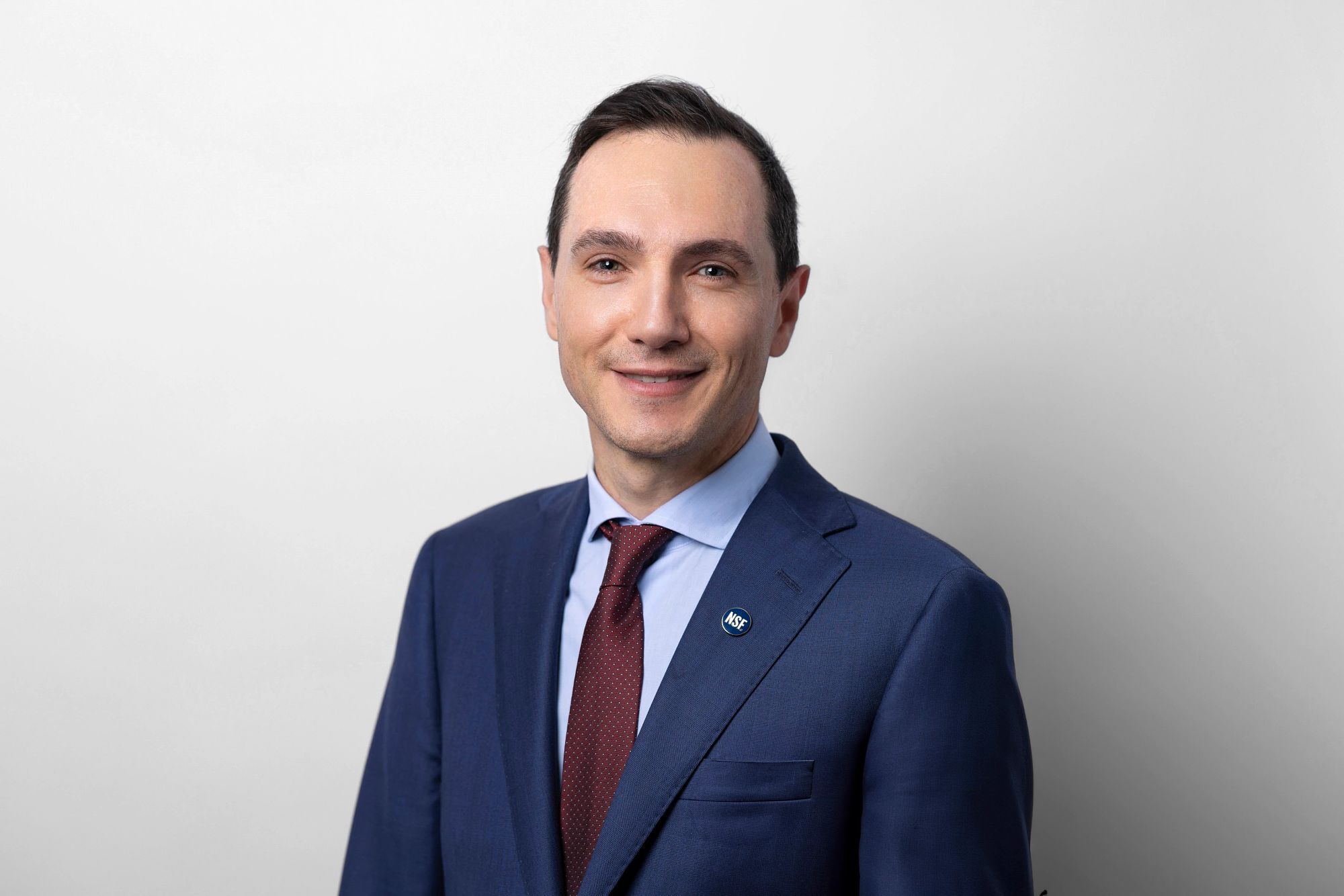Wendy Fanaselle Earns Walter F. Snyder Environmental Health Award from NSF and NEHA
ANN ARBOR, Mich. – NSF and the National Environmental Health Association (NEHA) are pleased to announce that Capt. Wendy Fanaselle, M.S., RS, DAAS, is the 2017 recipient of the distinguished Walter F. Snyder Environmental Health Award. Capt. Fanaselle will receive the award on July 12 at the NEHA Annual Education Conference in Grand Rapids, Michigan in recognition of more than 30 years of significant and lasting contributions to environmental and public health through leadership, collaboration and public service.
The Snyder Award honors NSF’s co-founder and first executive director, Walter F. Snyder, who provided outstanding contributions to the advancement of environmental and public health.
“Wendy Fanaselle’s accomplishments reflect the principles expressed by Walter F. Snyder and the public health mission of NSF,” says Kevan P. Lawlor, NSF President and CEO. “A hallmark of Capt. Fanaselle’s career has been bringing people together to craft and implement practical and effective solutions to environmental health problems and creating new systems to ensure the sustainability of these solutions. These accomplishments make her a worthy recipient of the Walter F. Snyder Award.”
“Capt. Fanaselle has worked tirelessly to improve public health throughout her career as an environmental health professional,” says David T. Dyjack, Dr.PH, CIH, Executive Director and CEO of NEHA. “She has had an amazing and impactful career, working to promote public health across a wide range of organizations and covering a variety of environmental health issues including food safety, injury prevention and access to medical care.”
Capt. Fanaselle is a Risk Assessment Project Manager for the U.S. FDA Center for Food Safety and Applied Nutrition (CFSAN), where she is responsible for overseeing and developing major food safety risk assessments. In this role, she has led the development of a risk assessment on foodborne norovirus acquired from ill employees in retail food facilities. The assessment quantitatively evaluates the impact of different interventions in food establishments on reducing the risk of norovirus foodborne illness, provides a better understanding of the norovirus transmission pathway and identifies compliance with removing symptomatic food employees as a priority in preventing norovirus foodborne illness.
Capt. Fanaselle co‐led the development of a novel geographic information-based model, partnering with NASA, that explores the power of environmental and climate data to provide the basis of an early warning system for produce farmers when environmental conditions indicate an increased risk of microbial contamination of pre‐harvest product. The pilot project focuses on California where a majority of domestic produce is grown and is now in the pilot test phase. She also led the development and publication of a risk assessment that provided scientific evidence to inform expanding drug residue sampling requirements beyond beta-lactams for milk and milk products.
Prior to this role, Capt. Fanaselle served as a Retail Food Specialist for CFSAN. She established and led the Federal Food Safety Coalition to facilitate updating national federal agency food safety policies and procedures to reflect the latest research, including the adoption of the U.S. Food Code by coalition members such as Native American communities, the National Park Service, the USDA school lunch program, and the U.S. Air Force, Army, Navy and Coast Guard. Capt. Fanaselle also led the Conference for Food Protection’s Inspection Form Committee as the FDA liaison to develop the first regulatory risk-based inspection form for retail food inspections, which is now in the Food Code Annex and widely used in conducting food safety inspections. She also participated in the development of the first FDA Standardized Retail Food Safety Inspector Program and was certified as an FDA Standardized Retail Food Safety Inspector.
Capt. Fanaselle’s work in support of hand hygiene and employee health issues led to her recognition as an agency subject matter expert on hand hygiene and employee health issues for retail food. She provided scientific research for justification of U.S. Food Code policies, and updated and developed new policies affecting retail food facilities in two editions of the U.S. Food Code: hand hygiene policies in 2001 to include provisions for no bare-hand contact and employee health policies and tools (such as charts, user-friendly forms and training materials) in 2005 to reduce foodborne norovirus illness.
Capt. Fanaselle helped ensure the health and safety of citizens following hurricanes. She was deployed after Hurricane Katrina to lead a team of U.S. Public Health Service (USPHS) environmental health officers in Baton Rouge. Capt. Fanaselle collaborated with Louisiana state and parish environmental health staff in organizing initiatives and ensuring that safety measures were followed in protecting consumers and staff members in and around New Orleans. She also led the USPHS Preventive Medicine Team deployed to Texas A&M University after Hurricane Ike, setting up and running one of the first USPHS large-scale field medical stations. The success of this deployment developed into a template for future USPHS deployments.
Capt. Fanaselle also led the development of two USPHS unified commands, partnering with state agencies to provide emergency response training and medical care. Working with the Tennessee State Health Department, she led USPHS Rapid Deployment Team #1 (RDF-1) of more than 100 USPHS officers in establishing the first state-operated field medical station, which is now used as a template in training other states. She also led RDF-1 in developing a partnership with the Texas Health Department, Texas State Guard and State National Guard in a mission to provide health care for people in need in South Texas.
Earlier in her career, Capt. Fanaselle served as a primary consultant on environmental health issues to the U.S. Immigration and Naturalization Service (INS, now Immigration and Customs Enforcement), single-handedly leading and designing the environmental health program for INS health care facilities and INS service processing centers.
After receiving a commission to the USPHS, she was assigned to the Indian Health Service where she designed and field tested a new approach to community-based fire and burn injury prevention in Tribal communities, utilizing social marketing, persuasive communication and community development and organization techniques. She also established the National Indian Safe Home Coalition, which brought together representatives from over 20 federal agencies and national organizations to develop safety programs.
Before that, Capt. Fanaselle served as an Environmental Health Specialist for Bloomington, Minnesota, inspecting and monitoring food and temporary housing facilities, including foodborne illness investigations. She began her career in 1983 as the Director of Environmental Health for the Devils Lake Sioux Tribe in North Dakota, developing and improving a community environmental health program.
Capt. Fanaselle is the recipient of the 2016 Davis Calvin Wagner Award. She has been a Registered Environmental Health Specialist since 1989, a Diplomate of the American Academy of Sanitarians since 2003 and a member of NEHA since 1989. She holds a B.S. in bacteriology and an M.S. in plant pathology and microbiology from North Dakota State University.
Snyder Award nominations are open to the public, and a juror panel of environmental health leaders selects the recipients. For more information about the Walter F. Snyder Award or to nominate a colleague for next year’s award, visit NSF’s website.
About NSF: NSF (nsf.org) is an independent, not-for-profit organization that develops consensus standards, and inspects, tests and certifies products for the food, water, health sciences and consumer products industries to minimize adverse health effects and protect the environment. Founded in 1944 at the University of Michigan School of Public Health, NSF is committed to protecting human health and safety worldwide. NSF is a Pan American Health Organization/World Health Organization Collaborating Center on Food Safety, Water Quality and Indoor Environment.
About NEHA: The National Environmental Health Association (neha.org) is a professional organization with more than 4,500 members in the public and private sectors as well as in universities and uniformed services. It publishes the peer-reviewed Journal of Environmental Health providing a valuable resource for the complete spectrum of environmental health topics. NEHA's mission, "to advance the environmental health and protection professional for the purpose of providing a healthful environment for all" is fulfilled in the products and services offered by NEHA through training, education, networking, professional development and policy involvement.
For media inquiries, please visit the NSF Contact Us page or email Joanne M. Zurcher, MPP, at JZurcher@neha.org.
Share this Article
How NSF Can Help You
Get in touch to find out how we can help you and your business thrive.

What’s New with NSF

NSF Celebrates 50 Years of the Safe Drinking Water Act
December 16, 2024
Brooklands New Media’s Publication On NSF’s Global Animal Wellness Standards (GAWS) Not Endorsed by NSF
November 25, 2024
NSF Announces Participation in Sustainable Foods 2025, CNBC Docuseries
November 18, 2024